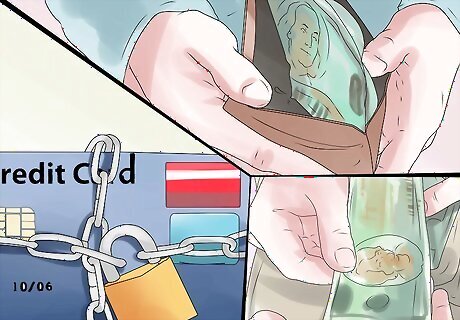
views
Dealing With Your History

Get square with your old landlord. When you get evicted from an apartment, the eviction appears on your credit report or in a background check. Before you try to rent another apartment, do your best to make things right with the old landlord, and ask whether he or she would consider having the eviction removed from your credit report. It won't be the most fun conversation to have, but it's definitely worth a try. Make sure you've paid the landlord all the money you owed. If there are any outstanding payments, it's not likely the landlord will cooperate. If you were evicted for non-financial reasons, correct the situation however you can. For example, if you damaged property, pay to have it fixed or replaced. If the landlord agrees to have the eviction removed, get his or her consent in writing. In some cases, there will be nothing you can do to make your landlord willing to remove the eviction from your credit report. You certainly don't want to push him or her too far. Don't worry, you'll still be able to find an apartment - it's just going to take more effort.

Obtain your credit report. The next step is to figure out exactly where things stand with your credit. You can get a free credit report annually at AnnualCreditReport.com, which details your credit report with Experian, TransUnion, and Equifax, the three major credit agencies. Check your report to make sure it's accurate. It's possible that inaccurate information could be dragging your credit down.

Work on restoring your credit. While you may not be able to drastically improve your credit score before you need to rent an apartment, it's very important to begin making a good faith effort right away. You'll need to be able to show potential landlords that the eviction on your credit report is not an indication of what type of tenant you'll be. Start paying your debts, including credit card debts and anything other debts that appear on your report. If you can't pay them off all at once, you should be able to come up with a payment plan so that you steadily pay them down. Start using cash instead of your credit card. This will keep your credit card debt from getting too inflated. Pay your credit card bill and utility bills on time every month. Missing a bill or two is very damaging to credit, even if you pay double the next month. After paying back rent or other monies owed, follow up by requesting another copy of your credit report to make sure the debt was removed.
Making Your Case

Find landlords amenable to your situation. While many landlords immediately pass over people who have been evicted, there are many others who will still rent as long as the person has presented a convincing case. It can be difficult to make contact with these lenient landlords, and it's disheartening to get turned down over and over before you finally find someone who will consider renting to you. Here are a few ways to find landlords who will listen: When you're browsing Craigslist.com and other apartment classifieds, look for apartments that don't require credit reports or background checks. Many individuals renting or subletting apartments don't conduct these checks. Ask your friends and family if they know anyone who would be open to renting to you. Word of mouth is a good way to find a new landlord, and if your friends and family know the person and can vouch for you, all the better. Consider using an apartment brokerage. Explain your situation and apartment preferences so that they only put you in touch with landlords willing to rent to people who have been evicted. This way you won't have to go through the headache of getting turned down. Keep in mind that you will have to pay a fee if you choose this method. You could also rent an apartment from a large rental agency, or in a large apartment community where there may be less restrictive guidelines for screening tenants.

Be honest up front. Your eviction is going to come to light if the landlord requires a background check or credit report, so lying or evading the issue is only going to make it worse. When the potential landlord asks you about your rental history, it's important that you bring this up. Tell the landlord what happened in a straightforward, concise way. Make it clear that you've paid your debts and done your best to put this situation behind you. Provide an explanation for the situation, if possible. For example, tell the property owner that you went through a period of unemployment, a divorce, or other life-changing situation that may be reflected on your credit history. Avoid trashing your old landlord behind his or her back. That's going to be a red flag for a potential landlord. It's not necessary to get into every last detail about what happened. For example, if property was damaged, tell the truth about what happened, but don't turn your story into a saga. After you've explained the situation, you can talk about something else. You may want to tell him or her about the eviction even if it is not on your credit report. Finding out about it from you directly is better than discovering you hid it during a background checks.

Make a good impression. Take extra care to appear pulled-together, responsible and polite when you meet with potential landlords. Show them the best side of your personality and make them feel at ease. After all, landlords are just people, and you can certainly gain an edge if you demonstrate that you're someone who would make a great tenant. Show up for the scheduled meeting a few minutes early. Make sure your clothes and hair are neat and clean. You might also consider dressing up a little - you'll appear more "responsible" if you don't show up in old sneakers and a sweatshirt. Smile and stay calm. If you seem fidgety and nervous, it's going to look like you're hiding something. Talk up your positive attributes. Discuss your job, your volunteer work, and other ways you're involved in the community in which you're hoping to rent an apartment. Time the visit appropriately if you are bring your children with you to meet the landlord. Don't schedule the appointment right before lunch or nap time, when the kids are likely to be tired and cranky. Notice the first impression your vehicle makes. Like your physical appearance, the upkeep of your car also reflects on how well you take care of property. A car overflowing with trash does not make a good first impression.

Provide personal references. Showing potential landlords that you've had good rental experiences is a great way to help them see past that black mark on your credit report. Contact old landlords with whom you had a solid relationship and ask them if they'd be willing to act as references. Provide their contact information to potential landlords. If you don't have old landlords who could serve as personal references, consider asking your boss or another coworker. Avoid asking your parents, siblings, or anyone else who shares your last name to serve as a personal reference.
Sealing the Deal

Offer to have a cosigner. This is often all it takes to put a potential landlord at ease. A cosigner would be partially responsible for making sure rent gets paid on time. If the landlord seems like he or she is on the fence about renting to you, tell him or her that you are willing to have a cosigner so he or she won't have a moment's worry about your ability to pay. Choose a cosigner who has a steady job and good rental references of his or her own. This method can be a little tricky, because you have to find a cosigner who would be willing to take the fall if you find yourself unable to make rent. Parents and close friends or family - people who would go out of their way to help you - are good choices when you're looking for a cosigner.

Offer to pay more. Some landlords will rent to people who've been evicted if they get a little something extra out of the deal. You could offer to pay several months' rent up front, or offer to pay a large security deposit. Decide what you're willing to offer beforehand. If your eviction was for non-payment of rent, offer to pay an additional month's rent, on top of what the landlord requests, to be held in escrow. For example, if the landlord wants one month's rent to hold as the last month's rent, offer to pay a second month's rent to be held with that money. Offer to double the security deposit if property damage was an issue related to the eviction, or if you are trying to get a landlord to allow a questionable pet. A large security deposit can go a long way towards assuaging a landlord's fears and increasing your chances of getting the apartment. The offer of extra money may be more necessary if you want to rent from a private landlord who only owns one or two apartments. He or she may not be able to afford the financial risk as much as a larger rental agency with many units. Don't feel like you have to offer more if you can't afford it. You should also avoid letting the landlord talk you into paying a larger sum than seems fair. If things don't work out with this landlord, there will be others. Continue working on your credit and searching for a situation that meets your needs - you'll find something.




















Comments
0 comment